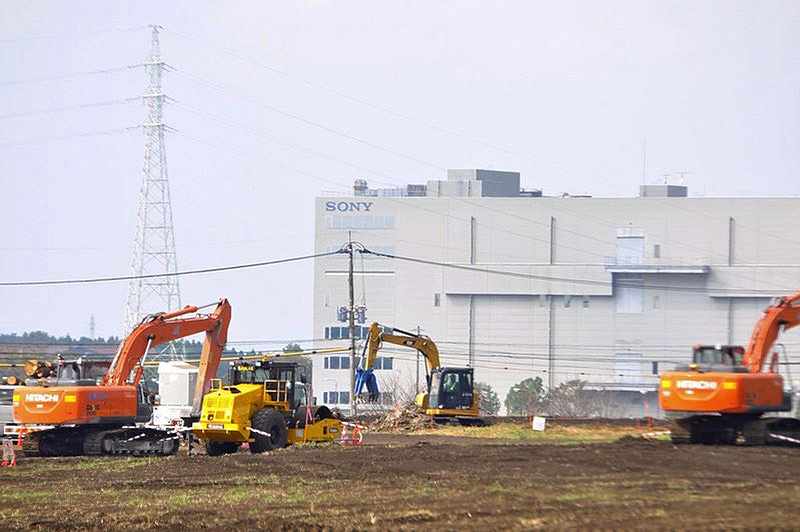
Land development for construction work is underway at a site adjacent to the Sony Group’s semiconductor plant in Kikuyo, Kumamoto Prefecture, in October.
November 18, 2021
The government is hurrying to establish a legal framework to provide subsidies to Taiwan Semiconductor Manufacturing Co. (TSMC), in response to the firm’s announcement of a plan to build a new chip plant in Kumamoto Prefecture.
Amid the global shortage of semiconductors, many countries are implementing financial measures to attract semiconductor businesses. Japan will also need to devise a scheme to provide continuing support for the industry.
“To take measures comparable to those of other countries, we will promptly secure the necessary budget and establish a framework for supporting [the chip industry] over multiple years,” Economy, Trade and Industry Minister Koichi Hagiuda said at a press conference on Nov. 10.
Japan relies on imports from Taiwan, China and other countries for more than 60% of its domestic demand for semiconductors. The shortage of semiconductors caused by disruptions in the supply chain amid the COVID-19 disaster has forced automakers to reduce production, and some have had to revise their sales plans.
The United States and the European Union have also decided to provide financial incentives to support factory areas, to protect their economic security.
Many countries are competing to attract semiconductor firms to their shores, and Japan is in a race against the clock.
Unusual support
The government had focused on bringing in TSMC, the world’s largest contract chip manufacturer, through such measures as directly encouraging the firm to build a new plant in Japan.
TSMC and Sony Group’s semiconductor subsidiary will jointly establish a new company to undertake semiconductor manufacturing and build a new plant in Kikuyo, Kumamoto Prefecture. The initial investment is expected to be about $7 billion (about ¥800 billion). Construction is scheduled to begin next year and production by 2024.
The government’s immediate subsidy to TSMC is expected to be up to ¥400 billion, an unprecedented level of support for a foreign company.
Currently, no legal framework exists for subsidizing the construction of new factories for semiconductors.
The government therefore intends to submit a bill to the extraordinary Diet session before the end of this year to revise related laws concerning support for companies developing technologies for the 5G high-speed, high-capacity communication standard. This will allow subsidies to be provided to the semiconductor industry.
The government will also establish rules for the approval of subsidies. In the event that the supply and demand of semiconductors is tight, it will require companies to give priority to supplying semiconductors to the Japanese market and to make continuing investments.
The ministry’s expert panel discussed specific measures at a meeting on Monday. The measures were to be included in the economic package to be compiled on Friday.
Domestic technology development
Circuit line width is a measure of a semiconductor’s performance. The smaller the width, the faster it can process calculations and the more power it can save.
The semiconductors to be produced by TSMC and Sony Group in Kumamoto Prefecture will have circuit line widths of 22 to 28 nanometers (a nanometer is a one-billionth of a meter). This size range is used in a wide variety of applications including cameras, industrial machinery and automobile anti-collision devices.
The most advanced semiconductors used in smartphones and computers have circuit line widths of seven nanometers or less, an area dominated by TSMC and Samsung Electronics Co.
Building a plant in Japan would be significant, given that semiconductors in the 22- to 28-nanometer range are in the shortest supply.
“To cope with the increasing speed and capacity of communications, more sophisticated semiconductors are needed. We need to attract major foreign companies and develop domestic technology in the most advanced fields as well,” said Hideki Wakabayashi, a professor at Tokyo University of Science.
Top Articles in Business
-

Prudential Life Insurance Plans to Fully Compensate for Damages Caused by Fraudulent Actions Without Waiting for Third-Party Committee Review
-

Narita Airport, Startup in Japan Demonstrate Machine to Compress Clothes for Tourists to Prevent People from Abandoning Suitcases
-

Japan, U.S. Name 3 Inaugural Investment Projects; Reached Agreement After Considerable Difficulty
-

Toyota Motor Group Firm to Sell Clean Energy Greenhouses for Strawberries
-

SoftBank Launches AI Service for Call Centers That Converts Harsh Customer Voices into Softer Voices
JN ACCESS RANKING
-

Japan PM Takaichi’s Cabinet Resigns en Masse
-

Japan Institute to Use Domestic Commercial Optical Lattice Clock to Set Japan Standard Time
-

Israeli Ambassador to Japan Speaks about Japan’s Role in the Reconstruction of Gaza
-

Man Infected with Measles Reportedly Dined at Restaurant in Tokyo Station
-

Videos Plagiarized, Reposted with False Subtitles Claiming ‘Ryukyu Belongs to China’; Anti-China False Information Also Posted in Japan




















